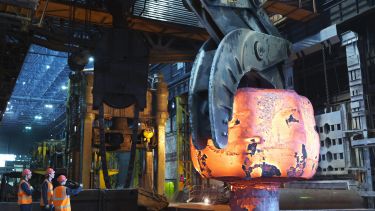- Academics from the University of Sheffield are part of two major new research hubs that are set to revolutionise UK steel and digital manufacturing
- IGNITE - a new £22 million hub - will transform the steel industry’s supply chain, boosting UK manufacturing, defence and energy
- Co-AIMS - a new ÂŁ13.7 million hub - will pioneer AI-powered manufacturing ecosystems that eliminate waste, boost productivity, and increase sustainability
Two major new research hubs that are set to revolutionise UK steel and digital manufacturing, have been launched with the help of researchers from the University of Sheffield.
IGNITE hub, led by Swansea University in collaboration with Professor Lenny Koh from the University of Sheffield’s Management School, will transform the UK’s steel industry’s supply chain, enhancing both the physical infrastructure and national security.
The new hub will explore how cutting-edge university research can accelerate industrial decarbonisation in the UK manufacturing industry. The primary goal is to deliver strategic, environmental and economic resilience for key strategic areas of the UK manufacturing economy including defence, transport and energy.
With the UK’s growing green steel demand outpacing domestic supply, IGNITE aims to boost domestic steel production, cut emissions and support low-carbon business models. It will develop smarter ways to manage, track and recycle the UK’s abundant supply of high-quality scrap whilst reshaping steel design and use to maintain quality and extend product life.
IGNITE stands for Indigenous Green-steel for Net-zero Innovation, Technology and Enterprise. It is funded by an ÂŁ11 million investment from the UKRI Engineering and Physical Sciences Research Council (EPSRC) as part of their flagship Sustainable Manufacturing Research Hubs program and is complemented by ÂŁ11.9 million in partner funding.
The hub brings together partners across the supply chain, including steelmakers, scrap processors, steel users, policy makers and multidisciplinary university expertise. The research disciplines include supply chain, manufacturing, management, materials and mechanical engineering. The hub builds on the success and advances the work of SUSTAIN hub.
SUSTAIN is a ÂŁ35 million, seven-year initiative supported by ÂŁ10 million from EPSRC and co-funded by:
- Universities
- Trade bodies
- Research and technology organisations
- Businesses
IGNITE will continue this work, helping the UK steel industry develop greener, more sustainable manufacturing solutions to secure its long-term future.
Professor Lenny Koh, Deputy Director of IGNITE and Chair in Operations Management at the University of Sheffield, said: "The IGNITE manufacturing hub will play an important role to enhance UK security, resilience and competitiveness across defence, energy and transport by transforming the UK manufacturing industry through holistic sustainability and supply chain optimisation of circular steels. The groundbreaking transdisciplinary work in IGNITE includes green steels / new materials, novel technologies, new models and tools co-developed with partners via a demand-led approach, maximising impact opportunities from day one."
Co-AIMS hub, led by Birmingham University in collaboration with Professor Ash Tiwari from the University of Sheffield’s School of Mechanical, Aerospace and Civil Engineering, will revolutionise UK manufacturing through Artificial Intelligence (AI) to help achieve Net Zero by 2050.
The Co-AIMS (Collaborative AI for Manufacturing Sustainability) Hub looks to pioneer AI-powered manufacturing ecosystems that eliminate waste, boost productivity, and increase sustainability.
The hub will work with manufacturers, technology providers, innovation centres, business associations, and regional authorities. This partnership will deliver safe, ethical, and inclusive technologies for sectors including automotive, aerospace, clean energy, and food and drink.
The Co-AIMS team includes experts in manufacturing, AI, robotics, ethics, and sustainability who will work with industrial partners to influence national policy, promote ethical AI adoption, as well as organising education and public engagement initiatives.
Manufacturing contributes 14 per cent of UK greenhouse gas emissions, and Co-AIMS researchers will explore ways of reducing this impact. Key objectives include:
- Empowering workers to contribute their skills regardless of location/physical ability
- Supercharging productivity by increasing the autonomy of AI-powered machines
- Enhancing resilience and agility in decentralised, circular production systems
- Encouraging knowledge exchange between industrial experts, factory workers, and academic researchers
The hub's research programme will be delivered through three main work streams: Research and Innovation, Community Building, and User Engagement.
At the University of Sheffield, researchers will lead on the development of adaptable, multimodal and edge-deployable foundational AI models that use federated learning and physics-based prior knowledge to enable real-time decision-making and optimisation in manufacturing.
Professor Ashutosh Tiwari FREng, Deputy Vice-President for Innovation at the University of Sheffield and Airbus/RAEng Chair in Digital Manufacturing, leading Co-AIMS at Sheffield, said: “We are really excited to be part of this hub. Co-AIMS presents a timely and strategic opportunity to reshape how we design and operate our factories by embedding AI into future industrial ecosystems - from smart machines to distributed logistics. We look forward to working with our academic and industrial partners to realise the productivity, sustainability and resilience benefits that AI promises for future manufacturing.”
Professor Sue Hartley, Vice-President for Research and Innovation at the University of Sheffield, said: “It is fantastic to see academics from Sheffield playing a key role in these two new research hubs, which are aiming to have such a huge, positive impact on the steel industry and manufacturing in the UK. The hubs demonstrate the importance of university research and the powerful impact that academic and industry collaborations can have in strategically important areas for the UK.”
Professor Charlotte Deane, Executive Chair of EPSRC, said: “These hubs will play a vital role in reshaping manufacturing to help the UK achieve green growth. By combining deep research expertise with real-world partnerships, they will develop the technologies, tools and systems we need for clean, competitive and resilient industries.




